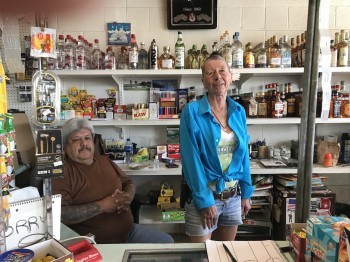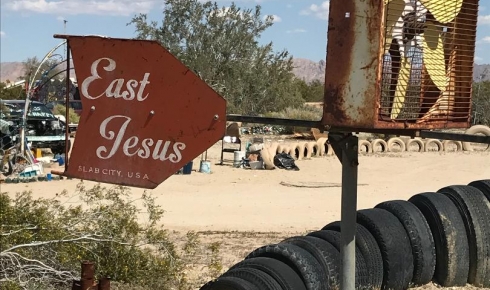East Jesus: A Desert Enclave for Artists and Free Spirits
by Pamela Thorsch
Imagine a world without waste—a world that takes advantage of every opportunity to use discarded, recycled, or repurposed materials to create an experimental, sustainable, and habitable “homesteaded town.” Artists and residents of East Jesus, California, have set out to do just that. About a three-hour drive from Los Angeles and a two-and-a-half hour drive from San Diego, you’ll find a vibrant artistic oasis in the Sonora desert near the Salton Sea.
The founder of East Jesus, the late Charlie Russell, wanted to create a life off the grid. So he packed up his belongings and ventured into the desert, eventually finding his way to Slab City, which is surrounded by 630 acres of vast desert. This is the site of a decommissioned WWII Marine Training Facility, Camp Dunlap. By 1956, the military base had been dismantled, leaving nothing but concrete slabs of the former barracks, hence the name.
Out of this rubble a thriving community developed, attracting artists, musicians, old hippies, and sun-seeking snowbirds. Leonard Knight had a calling to create Salvation Mountain (a plaster and paint creation over rock devoted to love and God), located near the entrance to Slab City, and this attracted more visitors. This open range soon became home to recreational vehicle owners and squatters alike, with no parking fees and no local municipal laws governing the citizens of “The Slabs.” Many of the new residents were driven there by poverty; others moved to stretch their retirement income; and others just wanted to be left alone.
The left alone part is just what Charlie was looking for, and in 2007 he set up camp in a trash-strewn field with a shipping container as his foundational structure, combined with two “art cars” he had created when attending Burning Man. His experimental village endeavor evolved into an ever-growing, ever-changing compound, which now includes a kitchen, living room, library, and music room with a grand piano. All of this is open to the sun and the stars, surrounded by intriguing sculptures made out of the trash.
This became the foundation for the development of East Jesus. Keep in mind that no religious connection is intended with the name. Russell, the self-proclaimed Mayor, named it for a place out in the middle of nowhere, off the beaten path.
 Contributing artists, photographers, musicians, writers, and survivalists have been drawn to visit, and some stayed – inspired to remake the world around them.
Contributing artists, photographers, musicians, writers, and survivalists have been drawn to visit, and some stayed – inspired to remake the world around them.
An incredible, awe-inspiring art garden grew out of the desert sand with installation art found everywhere. Your mind and spirit are immersed in the creativity and genius of the artists as you walk through the labyrinth of the garden, composed of recycled materials. This includes a wall of wine, beer and whisky bottles (whose contents undoubtedly required consumption prior to installing).
But this isn’t the only wall. There are a number of walls in East Jesus and the surrounding area. It struck me as odd that the off-the-grid residents in this so-called free society have found it necessary to wall off their neighbors, staking claims to their enclaves with borders. One person created a wall of discarded washing machines, another of old computer screens, and another a wall of old tires. No trespassing signs are posted. One reads: “DANGER: Armed and Bitter Libertarian Drunkards Live Here – Trespassers Will Be Used for Target Practice.”
 All of this raises questions: How free are we in our own minds? Have we been conditioned with “mine” versus “ours?” Is survival all about blocking ourselves out? Do we live in fear of others? What happened with the idea of the strength of the collective, acceptance, and tolerance? If a supposed self-proclaimed “free society” surrounded by nature finds the need for walls, is there any chance for humanity to find a way to live together in peace and harmony?
All of this raises questions: How free are we in our own minds? Have we been conditioned with “mine” versus “ours?” Is survival all about blocking ourselves out? Do we live in fear of others? What happened with the idea of the strength of the collective, acceptance, and tolerance? If a supposed self-proclaimed “free society” surrounded by nature finds the need for walls, is there any chance for humanity to find a way to live together in peace and harmony?
By the time Charlie died in 2011, there was a recognized need to create a more organized communal, healthy living environment with guiding principles, and ways to be more self-sustainable.
 This led to the creation of a 501C-3 non-profit organization, The Chasterus Foundation, whose board seeks to maintain and expand Charles Russell’s vision. The foundation has negotiated a land purchase contract with the state for 30 acres, in order to create a permanent home for artists. The foundation is currently raising money to pay off this land purchase and asks for donations from all visitors.
This led to the creation of a 501C-3 non-profit organization, The Chasterus Foundation, whose board seeks to maintain and expand Charles Russell’s vision. The foundation has negotiated a land purchase contract with the state for 30 acres, in order to create a permanent home for artists. The foundation is currently raising money to pay off this land purchase and asks for donations from all visitors.
With no access to water, water is hauled in from Niland, a small town you pass through on your way to the area. East Jesus residents have since installed solar power, a water tank, restroom facilities, hot showers, and small vegetable planters watered with grey water. Plans are underway to stock a chicken coop and plant aquaponic gardens…it’s a continual work in progress.
 East Jesus Sculpture Garden and Zen Center is open to visitors sunrise to sunset year round; however, the weather tends to be more enjoyable late September through mid-May. Admission is free, although donations are appreciated. Daily free tours conducted by residential staff are available. Visit www.eastjesus.org for more information. Prior to your visit, you might want to check out the community’s needs list and read the East Jesus Survival Guide.
East Jesus Sculpture Garden and Zen Center is open to visitors sunrise to sunset year round; however, the weather tends to be more enjoyable late September through mid-May. Admission is free, although donations are appreciated. Daily free tours conducted by residential staff are available. Visit www.eastjesus.org for more information. Prior to your visit, you might want to check out the community’s needs list and read the East Jesus Survival Guide.
 If you are feeling a bit adventurous, it’s certainly worth taking a day trip out to East Jesus, which is a slight detour off Highway 111. Plan enough time to stop and walk the northern shoreline of the Salton Sea, and don’t miss stopping to visit the International Banana Museum along the way. Be sure to say hi to Shelly, the liquor store owner next door to the museum—a mature woman, dressed in short shorts and packing a gun.
If you are feeling a bit adventurous, it’s certainly worth taking a day trip out to East Jesus, which is a slight detour off Highway 111. Plan enough time to stop and walk the northern shoreline of the Salton Sea, and don’t miss stopping to visit the International Banana Museum along the way. Be sure to say hi to Shelly, the liquor store owner next door to the museum—a mature woman, dressed in short shorts and packing a gun.
PS: It’s important to pack a survival kit of your own when visiting East Jesus, including water, sunscreen, a hat, and a few snacks or a picnic lunch, which won’t melt in the heat.
There are also volunteer opportunities available to assist with a wide span of projects in East Jesus, including the expansion of the sculpture garden. Those interested in exchanging labor, materials and/or expertise for food and shelter may contact them. They will also consider hosting visiting artists and overnight guests. Email: info@eastjesus.org.
Photos by Maxine Fischer

